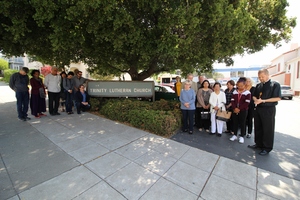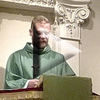A sermon on how to read from one's unique perspective, and how to listen to others
The text notes I preached from are after the sermon audio for convenience, however, I suggest you listen to the sermon audio, because there were numerous changes during the delivery. It is in the delivery of a sermon in the midst of the people of God which is where he Holy Spirit is doing the strongest work within me; and there will not only be some changes to the notes but also emphasis and intonations that don't occur in the notes.
Sermon delivered at Trinity Evangelical Lutheran Church of Oakland
May 3, 2015 - 5th Sunday of Easter
"Reading Baltimore" - Lectionary text from Acts 8:26-40.
Greetings my sisters and brothers, saints and sinners, children of God.
In the book of Acts we have an account about an Ethiopian court official who, after having been to Jerusalem to worship, is on his way back home, his head buried in text from the prophet Isaiah. The Holy Spirit impels an encounter between this court official and Philip, who was recently been commissioned as one of the seven Greek-speaking Jews to manage affairs in Jerusalem. As with many of the stories of God's people, Philip happens to find the spirit calling him toward evangelism, as we discover as we read through Acts.

Now, one of the things that makes this account stand out to me is the fact that this court official to the queen happens to be described as a eunuch. And having considered himself a faithful servant of the God of Israel, nevertheless possessed an impairment most probably inflicted on him in childhood, that prevented him from being able to procreate. This therefore would make him considered as not a whole person and unable to stand in the temple as would an observant Jew. For me makes me think of the struggle of many people who would be considered sexual and gender minorities and our separation until recently from full participation with the church. And it reminds me that even though nominally, queer pastors like myself may be ordained by our own church body, being considered for a call can often be more difficult a problem, as it has been with women and people of color; despite the fact that we, as Lutherans have declared that we will as a body, respect the vocation that God has called us into. This text gives me something to look back on to reflect on that yes, that someone once considered on the outside, can be considered as fully a child of God, able to worship and respect and participate in the family of God with a place in his holy and heavenly kingdom.
But in watching the events over the last week in Baltimore, as well as as well as listening to and reading people's reactions with bafflement, and also bringing my own experience to mind, I find that I am reading this story with a different lens. And so let me bring us back to the text. The Ethiopian official is riding home and reading text from Isaiah, out loud, whereupon the Holy Spirit brings Philip and the Ethiopian official together, and Philip hears the man reading and recognizes it and asks him frankly if he understands what it is he is reading.
The official responds to Philip, in all seriousness, "How can I, unless someone guides me?" Because no matter what happened e in Jerusalem only a little while earlier, the official clearly had no context nor inkling. So while we Christians today know exactly what the language of "sheep and slaughter; of the silent lamb and denied justice, of life being taken away"; this eunuch had no experience with which to understand it. And how could he be able to interpret it, to dig deeply into it, to let the spirit guide his actions and behavior with no understanding of the scripture that he was drawn to?
We all have our own individual and unique contexts from we draw our information, our lenses and how we manage our relationships. I have labels about myself that I can use to relate to my fellow human, that I can use in my own experience: queer, chronic health affected, recovering addict; that describe my experience in the world and my perspective, that are parts of me but not wholly me, that bring me a, personally, rather limited understanding of what oppression means. So it is when someone asks me, "why are gay people looking for special rights?" or "why should everyone have access to health care?" or "why do those people need to always go to meetings?" I can begin to explain unconditionally my own unique perspective.
But there are other labels that I have that mark me in a different way, labels that are characteristics that can get in the way of reading other people, like white, male, middle-aged, middle class, American-born. Characteristics that mark me with privilege that make it difficult to see the experience of others. And like the Ethiopian Eunuch, reading the text of Isaiah, I need to be willing to hear, when I'm simply shouting out words that do not have meaning, that fail to understand the enormity of a situation, when someone says to me, "Do you really understand what you're reading?" I might believe that rioting and property destruction is wrong, and it might occur to me to say that "Hey, look at you folks, don't you know this doesn't help your cause at all?" But when people respond to me with comments like "why am I more worried about broken glass than broken lives?" it is incumbent on me to sit back take a cue and say, "What is going on here that I don't get?"
Because unless I am walking in the shoes of my neighbor, I do not understand how their shoes make their feet sore and give them blisters. Unless I walk their streets, I cannot see how they stumble over stones and fall over potholes. Unless I open my ears and listen to them when they say "we are crying, we are hurting, we are dying?" I run the risk of being silent to their plight and worse, being a part and parcel to the injustice that goes along with it. God can bring me close to the neighbor, but unless I allow them into my life, open my eyes to see them and open my ears to hear them, I will never know what they experience.
I can complain about the damage being done to Baltimore, but someone explains to me the deep roots, what it is like being a black man under 25, raised in poverty, with no employment and very few prospects, with a government that has little more to offer than "pick yourself up by your bootstraps"; I can do little more than continue perpetuating the cycle of harm and violence that has already been enacted upon these young men and their families. How can I do anything more than be oppressive if I fail to understand the oppression that crumbles dreams and frustrates these people to where throwing a rock at police and lighting windows on fire seem to be the only outlet.
But this is the body of Christ, my sisters and brothers. And we can no more tolerate the branches of the vine that choke out other branches, making them wither when they should very well be bearing fruit than we could tolerate being pruned ourselves. Sharing the love for our neighbor, and remember that our Lord has bestowed upon us unconditional grace and mercy, that our lives are forgiven, means that we lift people up.
The love of God that we share in our hearts for our fellow human being means that we all win, we all succeed. When we hear that "Black Lives Matter" it is in no way implying that Other Lives Don't Matter. It means that as a body, there are people without our own experiences who have felt ignored, invisible and neglected for a long period of time, who despite the fact that they live in the wealthiest nation that has had the largest economy on earth for arguably over a century, that they still struggle to simply find a job, and eat a healthy meal. That an all-too-routine stop by the police shouldn't involve handguns, that execution is not a valid sentence for suspected shoplifting. That we have reached a point in our society that has become so stressful and that too many police feel that lethal force is the first option when dealing with a suspect, and of the 621 deaths carried out by reporting law enforcement in 2014, over a third of them are African-American.
That even those of us who often struggle day to day in our own lives can stand in solidarity. That justice means taking a strong hard look at how our society and not say first, "Please don't throw stones and destroy property" but say, "Please don't put people in a position where they feel their only option is to throw stones and destroy property."
Because the good news today, my sisters and brothers is that we have a God who loves us unconditionally, and has through his glorious resurrection bestowed upon us the grace and mercy that leads us into his kingdom. And that same God has empowered us to share that love and grace with our neighbor. That even now, even today we can still back up and say to someone who does not look and act like us, you are a glorious child of God, and you are loved.
"And my neighbor, I will love you as God has loved me."
We have one life on earth, sisters and brothers, but God has given us a kingdom to share in eternity. Let us live into that kingdom here and now.
And live, my sisters and brothers, the good news of the Son of God who has, on rising on the cross defeated death that we may live.
Amen.


